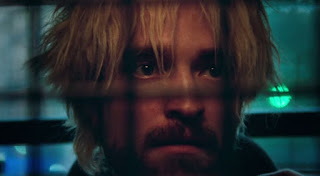"Don't you understand? I'm not a queen, nor a monster. I'm the goddess of death."
I must admit that I was lukewarm over the prospect of
another ‘Thor’ instalment to the MCU, not that I’d regard the previous two as
bad films but they’re also far from anyone’s favourite Marvel movies. However,
the idea of a new Taika Waititi movie is something that greatly interests me,
given that ‘What We Do in the Shadows’ and ‘Hunt for the Wilderpeople’ have
marked him out as one of the finest comedic directors working today. So could
this be a match made in Valhalla?
Imprisoned on the other side of the universe, the mighty
Thor (Chris Hemsworth) finds himself in a deadly gladiatorial contest that pits
him against the Hulk (Mark Ruffalo), his former ally and fellow Avenger. Thor's
quest for survival leads him in a race against time to prevent the all-powerful
Hela (Cate Blanchett) from destroying his home world and the Asgardian
civilization.
When I first heard the premise and title for ‘Thor: Ragnarok’,
I envisioned it as a more serious kind of Marvel movie, one that would raise
the stakes and forever change the dynamic of the characters involved. So on
that front I am a little disappointed that the end result leans more into
comedy than anything else. But at the same time I shouldn’t have expected
anything else from Waititi, as well as the fact that said comedy is hilarious
as well as hugely entertaining. Make no mistake, ‘Thor: Ragnarok’ is a fun and immensely
enjoyable movie that maintains the standards of quality we have come to expect
from Marvel by now.
So while it’s not a radical departure from the usual Marvel
routine, it delivers in what any fan of Waititi and the MCU as a whole could
want. I was initially worried as the movie starts off feeling terribly muddled.
The pacing and structure of its opening act are all over the place, throwing
one narrative beat and revelation at the audience in quick succession without
ever giving them time to sink in. I think this is due to Waititi’s comic
sensibilities leading to him pacing his movie as one would for a comedy film.
It’s a light and breezy opening which plays high on laughs but fails to
establish an immediate connection to the plot as it begins to unfold.
Luckily though, once ‘Thor: Ragnarok’ sinks into its stride
it rarely looks back from there. It interweaves its comedy and moments of high
drama nicely as well as some fantastic action set pieces that are as inventive
as they are humorous. I’ll admit that I was never glued to the edge of my seat
but I was thoroughly invested in each set piece as they continued to escalate.
The highlight is undoubtedly the Thor vs Hulk throw down but Waititi’s method
of gradually building each scene in scale as the movie progresses allows them
to never feel stale. Save for a few clunky moments when handling the tone and
plot exposition it’s satisfying.
The characters also feel well utilised. Watching Thor interact
with Ruffalo’s Bruce Banner as well as his big green alter ego makes for a
brilliant dynamic, as does his pairing with Tessa Thompson’s hard drinking
bounty hunter. As ever Tom Hiddlestone is immensely watchable as Loki and
though it’s disappointing that he never goes full blown villain his presence is
more than welcome and leads to some cathartic drama. Despite struggling to feel
like a prevalent threat for a majority of the movie, Cate Blanchett is also
great as the all-powerful goddess of death. She manages to chew the scenery
without ever feeling like an overbearing addition.
The clever use of characters lends itself to the fact that
the strongest aspect of ‘Thor: Ragnarok’ is its superb cast. As I already said,
each main player is bringing their all to the role and bounces off one another
excellently. But all of this goes without mentioning the likes of Jeff Goldblum
who I assume just acted as he would normally had he been at home, but here they
just happened to catch it on film. The director himself also brings his always
excellent comedic presence in an unexpected but hilarious role. Then there are
the cameos which I won’t dare spoil as it probably stands as the single best
cameo in the history of the MCU, and it’s not by Stan Lee would you believe it.
At the end of the day, the biggest complaint I can level at
this movie is that of tonal consistency. Sometimes it does feel as Waititi’s priority
was to bring forth the best performances from his cast rather than focus upon
the movie as a piece of the MCU. The pieces that feel most jarring and out of
place in its first act are those that are there to either tie up the continuity
of the previous instalments or link it to other MCU properties. Even these
scenes are still highly entertaining in their own right, but they don’t quite
fit properly within this movie.
Despite a bumpy start, once ‘Thor: Ragnarok’ kicks into gear
it’s a hugely entertaining spectacle of humour, heart and Hulk.
Result: 7/10


























